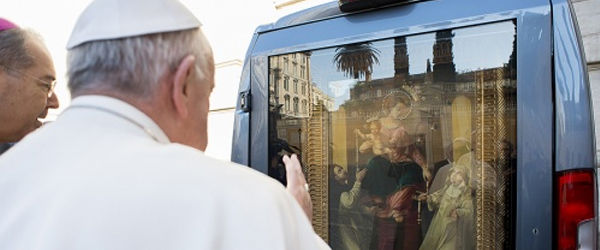Americans in a telephone survey conducted in 2010 said they believe news media coverage of religion is sensationalized.The survey findings, released only April 5, also revealed different types of audiences for religious news, including the "focused" and "specialized" consumers of religious news who make up about one-fourth of all media consumers.
In the survey authors' definition, focused consumers are those with strong religious leanings and who are regular consumers of media, while specialized consumers have a weaker desire to consume media.
The majority in these categories are women, are "more likely to live in the South, and are less affluent and older, than the public as a whole," said the report, a joint project of the Annenberg School for Communication & Journalism at the University of Southern California and the Ray C. Bliss Institute of Applied Politics at the University of Akron in Ohio.
The survey also interviewed reporters, and found differences between them and their audiences in their perception of what constitutes religion news.
"Things have changed from 2010 to now, obviously, but things between 2000 and now have changed astronomically in terms of the online news universe," said one of the study's principal authors, Diane Winston of the University of Southern California.
Just in the past two years, Winston told Catholic News Service in an April 10 telephone interview, "there's been a proliferation of online sites, specialized sites where people can read different kinds of religious commentary. ... There are probably more (content) aggregators now than in 2010 that specialize in religious news."
John R. Green, Bliss Institute director at the University of Akron and the other co-author, said the people who "care most" about religious news are the ones who complain most about sensationalized coverage. They would prefer that religion coverage focus on individuals' religious experiences, spirituality, practices and beliefs, he said.
"The highly religious people who were not regular consumers of the news media tended to be the most critical" of coverage," Bliss told CNS. "Who knows why that is? Maybe they don't use the media a lot because they don't like what they see and read."
The survey reached 2,000 Americans by telephone, and has a margin of error of plus or minus 3 percentage points. The survey also interviewed 800 reporters, with an error margin of plus or minus 4 percentage points.
Among the reporters, one-sixth said religion coverage was central to their job and one-fifth said it came up frequently in their work.
One big difference between the reporters and Americans at large was in their view of religion's role in society.
The public is "sharply polarized" on the issue; 52.6 percent said religion was on balance a force for good in the world, while 43.6 percent it was a source of conflict. But among reporters, 56.1 percent reporters said religion is a mix of good and conflict, compared to 3.8 percent of the public who see it that way.
Reporters, in contrast to consumers of news, said religion news should emphasize religious institutions, activities, events and personalities.
Only one-fifth of the reporters said they were "very knowledgeable" about religion. Green told CNS that most reporters based their religion knowledge on what they knew and practiced growing up.
Green said reporters complained about not having enough time and resources to do stories on religion, or having too few contacts in the field. He added that one surprising element of the reporters' responses was a lack of interference from editors for the articles they did write.
"There is no one media world," Winston told CNS. The Washington Post "has really had to step up its game" with its On Faith blog, she said, to compete in the blogosphere.
Sectarian media, Winston added, "tend to cover their issues fairly well, if not aggressively. If you want to read diverse Jewish opinions on Israel, you're not going to get it in the Jewish media," but readers would find "minutiae on Jewish life. In the same way the Catholic media may not give you the most insider information on global sex scandals, but it will give you the most up-to-date information on what the pope is doing."
Still, Winston said, "you can get what you want if you look for it. If I wanted to find out what's going on in Catholic life and did not get a Catholic newspaper, I would have a hard time."
---CNS
{gallery width=100 height=100}gallery/2012/0420/reporting/{/gallery}

